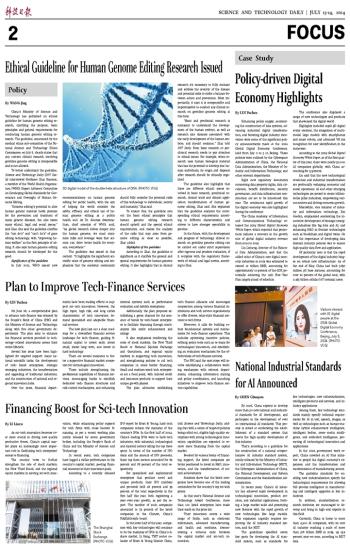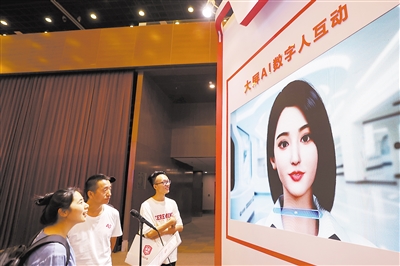
 |
| Visitors interact with AI digital people at the 2024 Global Digital Economy Conference, Beijing, July 5, 2024. (PHOTO: VCG) |
Enhancing policy supply, accelerating the construction of data systems, advancing industrial digital transformation, and fostering digital industry innovation were some of the significant policy announcements made at the 2024 Global Digital Economy Conference, held from July 2 to 5 in Beijing. These policies were outlined by the Cyberspace Administration of China, the National Data Administration, the Ministry of Industry and Information Technology, and other relevant departments.
Eight new regulatory documents concerning data property rights, data circulation, benefit distribution, security governance, and data infrastructure construction are set to be introduced this year. The continuous rapid growth of the digital economy was also highlighted during the conference.
The China Academy of Information and Communications Technology released the 2024 Global Digital Economy White Paper, which reported that projections indicate a recovery in the growth rate of global digital industry revenue from 2024 to 2025.
Liu Liehong, director of the National Data Administration, said that the added value of China's core digital economy industries in 2023 was estimated to exceed 12 trillion RMB, accounting for approximately 10 percent of the GDP, potentially achieving the 14th Five-Year Plan targets ahead of schedule.
The conference also displayed a range of new technologies and products that showcased the digital world.
Highlights included rapid 3D digital avatar creation, the integration of multimodal large models with smartphones and smart robots, and advanced VR iris recognition for user identification in the metaverse.
According to the 2024 Global Digital Economy White Paper, as of the first quarter of this year, there were nearly 30,000 AI companies globally, with China accounting for 15 percent.
Liu said that the new technological revolution and industrial transformation are profoundly reshaping economic and social operations. AI and other emerging technologies are poised to create trillion-dollar pillar industries, empowering various sectors and driving economic growth.
Meanwhile, vice minister of industry and information technology, Xin Guobin, emphasized accelerating the innovative development of strategic emerging industries like big data and AI, and enhancing R&D in frontier technologies such as blockchain and digital twins. He said the importance of developing data element industry policies was to ensure high-quality data flow and application.
Of particular note is that the rapid development of the digital industry hinges on robust new infrastructure. As of the end of May, China had built 3.837 million 5G base stations, accounting for over 60 percent of the global total, with 2.465 billion cellular IoT terminal users.


 Next
Next




